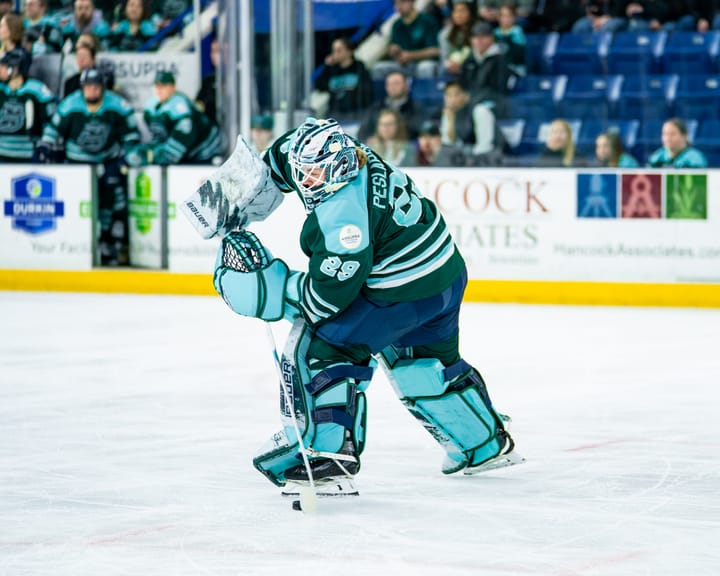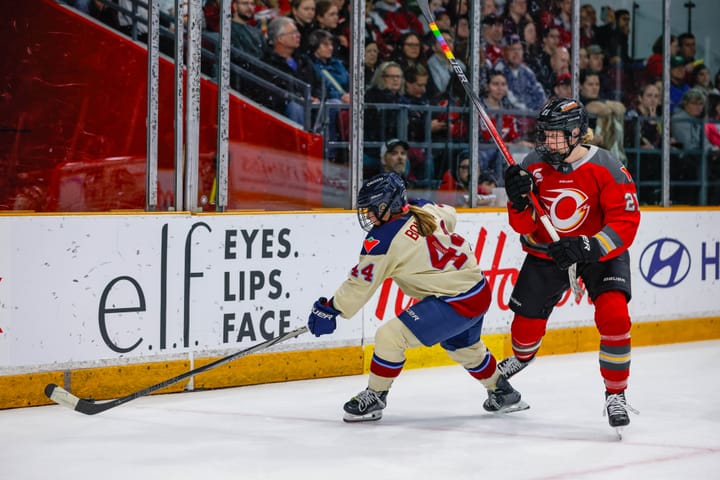RSEQ Week one: Three ups, three downs
Carleton, Concordia, Montreal, and Ottawa began conference play while McGill wrapped up its preseason
The Réseau du sport étudiant du Québec (RSEQ), which features teams in Montreal and Ottawa, began easing into league play last weekend. Four of five schools began conference play, while McGill ― the 2017 RSEQ champion and U SPORTS runner-up ― played its annual Ivy League NCAA exhibition series and will begin RSEQ contests this week.
Last week's results:
*McGill 1 - 6 Harvard
Montreal 1 - 2 Carleton
*McGill 4 - 2 Yale
*McGill 7 - 2 Dartmouth
Concordia 1 - 3 Ottawa
*Denotes exhibition match
Three up
The Carleton Ravens: It took a shootout to get it done, but the Ravens opened their season with a statement game on home ice. Montreal has been a powerhouse not only in RSEQ but in U SPORTS as a whole, having won two national titles in the program's first seven years of existence. Carleton, meanwhile, has consistently been at the bottom of the standings and recently lost its three top scorers from 2016-17. Montreal outshot the Ravens 38-25, but Carleton has solid goaltending and its offence is showing it can beat the best.
Parity: RSEQ games have become closer and closer over the past few years, but Carleton's continued improvement only adds to that. Exclude Ottawa's empty-netter and both conference match-ups this week ended 2-1. The three middle teams last year had near-even records, and with four-time league-leading scorer and 2014 Olympic champion Mélodie Daoust ― who regularly played huge minutes in all situations for first-place McGill ― out of the mix, the race for the conference title (and nationals berths) could be tighter than ever.
Development: The Concordia Stingers upset the defending U SPORTS champion Montreal Carabins and placed fourth at nationals last year; now they're out to prove it wasn't a fluke. Concordia lost 3-1 to the Ottawa Gee-Gees on Sunday, but one goal was an empty-netter and shots were even at 29 apiece. Ottawa seriously threatened McGill in both 2016 and 2017, and boasts Mélodie Bouchard ― who, as a rookie, challenged Daoust for the 2016 scoring title ― at forward. The teams were, respectively, 10-9-1 and 9-10-1 last year, and this relatively even showing bodes well for their chances of maintaining their previous levels into 2017-18.
Three down
The Carabins' offense: After winning the national championship in 2016, the Carabins closed an inconsistent 2016-17 campaign by losing to Concordia in the RSEQ semifinals. Montreal has multiple forwards with international experience ― the quality is there ― but they haven't been able to score when needed. One goal on 38 shots against the Ravens might boil down to bad luck and a hot goalie, but combine that with zero goals in the shootout, along with last year's woes, and it starts to look like a red flag.
McGill's goaltending: Last year Tricia Deguire, a relatively unknown rookie who had never before worked with a goalie coach, began the season as starter by necessity and proved that she more than deserved the role, winning Rookie of the Year honors at both the RSEQ and U SPORTS levels. So far, the preseason has been wildly inconsistent, but with a young team facing out-of-conference opponents with different playing styles, it's probably not worth ringing the alarm bells just yet. The McGill Martlets have two sophomore goalies and one freshman, but the 2016-17 squad relied on two (mostly one) rookies in net and still made it all the way to the national final.
Reffing: A four-official system was introduced late last season, in February of 2017. That doesn't appear to have lasted, since both RSEQ games this weekend featured one referee and two linesmen. There was only one regular-season game in Ottawa after the switch, and that game had just three officials, but the playoff match in Ottawa had four, so the scope of the initial change is unclear. Montreal-based matches have featured all-women officiating crews for a number of years now, and crews for Ottawa-based games tend to be mixed. The reasons for the changes, both to four officials and back to three, aren't known ― it's possible there were issues securing qualified officials. If there's a universal reversion to three, though, that appears to decrease the quality of officiating on the ice as well the opportunities available to female officials who wish to ref high-level games on a regular basis. If it's four in Montreal and three in Ottawa, well, that's just bizarre.
This week's schedule:
Friday, Oct. 20:
7:30 p.m.: Carleton @ Montreal (10)
Saturday, Oct. 21:
3 p.m.: McGill (3) @ Concordia (5)
Sunday, Oct. 22:
6 p.m.: Ottawa @ Carleton
(national coaches' poll ranking)





Comments ()